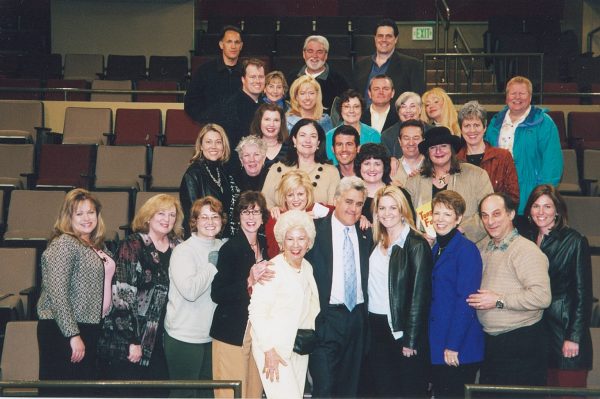Ever learn something the hard way? I did when a group of speaker friends and I were part of the Tonight Show’s studio audience. Jay Leno came out before the show to answer questions. Unbelievably, Jay called on me first. My thought was, “I’ll ask him something intelligent about his interviews. Then, I’ll ask for what I really want … a picture.”
Jay briefly responded to my first question, laughed and moved on to a woman who asked for a picture. As she made her way to the stage, he looked back at me. Jay said, “You really wanted a picture with me didn’t you?” Embarrassed, I nodded thinking he’d call me down as well. Then, Jay replied with a chuckle, “Well, SHE asked.”
The person who asked for the photo got the picture I really wanted.
***By the way, I did manage to get in the group photo with Jay. Squint to see me in the photo above – I’m in the middle above his head. Photo credit: Colette Carlson.***
According to the research for my TEDx talk and new book, Ask Outrageously: The Secret to Getting What You Really Want, I’m not alone. More than two thirds of us failed to ask for something big. Later someone else asked and was granted what we really wanted.
In the research, people shared why asking others is difficult. The top reasons are, “I may:”
Overwhelm or bug the person I’m asking.
Not use the right words to get my message across.
Look stupid or embarrass myself.
Be told “no.”
Interestingly, the top responses concerned how the requestor is perceived. Take note of your perception of three tactics people use to make requests:
The Higher Authority Tactic: Allows delay and a chance to gain an advantage by claiming additional approval is needed by a boss, committee, partner, spouse, board of directors, etc.
Your Counterattack: First, ask about their “process” to make decisions. When someone neglects to state additional approval is required, ask “They usually follow your recommendations don’t they?” and “You are recommending what I’m asking for, correct?”
You can use this tactic if you share the need for final approval upfront. Announcing you lack authority after someone dealt with you in good faith can be a deal breaker.
The Got Your Back Tactic: Someone agrees with you but later doesn’t follow through or defend your decisions and agreements. He or she acts reasonable and supportive but then never produces what is promised.
Your Counterattack: If you suspect this behavior, ask the person to share any doubts or concerns now. Discourage unrealistic promises. Make your agreements public to create accountability.
Avoid this tactic. This shifty conduct is used by jerks. Don’t tarnish your reputation. Your word is your bond.
The Set Aside Tactic: Used to gain buy-in and postpone objections. When one side won’t budge the other says, “I understand your position. Let’s set that aside for now and talk about these other issues.”
Your Counterattack: Say, “No, this is the main issue for me and I want us to resolve it first.” If you agree to wait on a matter, remember to address it before finalizing an agreement.
You can use this tactic if you find yourself stuck or want to quickly agree to undisputed matters. Ethically, this strategy allows you to gain momentum and determine if an agreement is probable before focusing your attention on the areas of contention.
By the way, people who rely only on tactics are amateurs. Increase your odds of getting what you really want by asking for it first and supporting your request with good reasons. To help you identify more tactics and counterattacks download these Top Tactics and Counterattacks.
Journey On!
About Linda: A recognized authority on negotiations, workplace issues and strategic communication, Linda Swindling, JD, CSP is an author, media expert, a “recovering” employment attorney, and a professional speaker. Contact us to book Linda to speak at your event.
